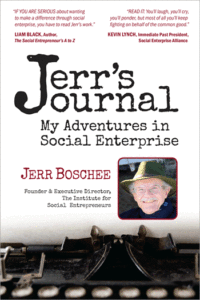I knew of Jerr Boschee long before I met him – he is a legend in the social enterprise space. I now am lucky enough to count him as a close friend and mentor. A standout in the field, he has held many noteworthy positions throughout his career. He is a former CEO of The National Center for Social Entrepreneurs and co-founder of the Social Enterprise Alliance. He has also been named to The Nonprofit Times “Power & Influence Top 50” multiple times.
But, what he is most proud of is his students – from those he taught in the Peace Corps to those he teaches now as a professor at Pepperdine University. He has also taught many of us through his speeches and his blog – Jerr’s Journal. In fact, his magical way of weaving stories into substantive lessons about social enterprise has influenced my own blog.
After 35 years of giving back, Jerr has decided to scale back his writing and recently compiled his blog into a free e-book, Jerr’s Journal: My Adventures in Social Enterprise. In it, he shares his hard-won wisdom, earned through decades of experience, and charts the evolution of social enterprise. His personal and professional anecdotes are laced with profound lessons – never shying away from how hard, yet satisfying, the life of a social entrepreneur really is.
In a world where social enterprise is now mainstream and pop-up social incubators are in almost every major city and on every college campus, Jerr’s advice is both sobering and inspiring all at once.
While I encourage you to read the e-book, here is a sample of my 9 favorite “Jerr”isms:
- Great Social Entrepreneurs Are “Tightrope Walkers”(p. 111) – Maintaining a balance between social impact and financial viability is the “sine qua non of social enterprise.” Jerr reminds us that to be called a social entrepreneur, both have to be kept in check.
- Everyone Needs to Produce Value (p. 157) – Jerr does a masterful job discussing how social enterprise can be a vehicle for change for people who are disabled and disadvantaged. Jerr helped start and advise many of the early social enterprises that redefined how to support disadvantaged populations, including his early work in the 1980s with Control Data Corporation’s Bill Norris, who was known for saying, “our mission is to address the major unmet needs of society as profitable business opportunities.” As Jerr would say, it is far better to help an individual become productive through a job than pity them with a handout.
- Culture Matters(p. 114) – As a community, we spend a lot of time discussing feasibility assessments and business plans, but Jerr was one of the early thinkers that made sure we equally considered culture in the recipe for a successful social enterprise. He also notes on many occasions how different entrepreneurial culture is from that of a traditional nonprofit.
- Don’t Choke on Too Many Ideas(p. 141) – Research shows that too many ideas lead to mediocrity and analysis paralysis. Jerr shares his tips on how you can use market research to narrow your focus on the best ideas for your social enterprise.
- Right Leaders at the Right Time(p. 47) – One of my favorite lessons learned from Jerr (and one that I borrow for my social entrepreneurship class every year) is the difference between innovators (dreamers), entrepreneurs (business builders) and professional managers (trustees). Each are needed at different times to move the social enterprise forward. It is also important to know where your strengths lie and when they are most needed in the evolution of a social enterprise.
- Teams Require a Mix of Experiences & Expertise(p. 72) – Just as organizations need various leaders, they also need various employees on their teams – achievers (getting results), agitators (getting things done right), negotiators (getting things done together peacefully) and navigators (heading in the right direction) – to ensure the greatest impact.
- Know Your Customer(p. 96) – As Jerr says, “Customer service starts on the street, not in the tower.” He and I are both advocates of engaging in customer research – even acting as mystery shoppers in your own organizations – to ensure that the customer experience is up to par.
- The Power of Storytelling(p. 104) – As a gifted storyteller, Jerr shares four questions we need to ask ourselves to make stories compelling and lead readers to action: Who are we trying to convince? What do we want them to do? What do they have to believe before they will do it? What do they believe now? Then, our job is to simply close the gap within the story.
- Never Be Comfortable(p. 108) – Change is inevitable, and Jerr argues that the best social entrepreneurs believe and are conditioned to be comfortable with “change as a constant.” They are always on the lookout for disruption in their current business model by looking outward, looking backward, looking inward and looking forward.
Without question, Jerr’s Journal should be required reading BEFORE any social entrepreneur sets sail on their own adventure. It is a quick read for amateurs and experienced social entrepreneurs alike.
You will walk away emboldened that social enterprise, while challenging, is important to not only practice, but also get right in today’s world.
One of my favorite things about Jerr is that he learns from everyone he meets – deep down he is still that curious kid who, as baseball legend Dick Siebert would say, has more hustle than anyone else I know. If you have read Jerr’s book or seen him speak, share your favorite Jerrism. Tune in next week as we share our tips on crafting the perfect elevator pitch.
P.S. Jerr, the Fog Index (p. 147) of this article is 12.38. Thought you’d be proud – I learned from the best!
Suzanne Smith is a serial social entrepreneur and bridges many disciplines as a coach and consultant to social sector organizations as Founder and Managing Director of Social Impact Architects and Co-Founder of Flywheel: Social Enterprise Hub. She also educates future social entrepreneurs as a frequent guest lecturer at campuses across the country and as Adjunct Professor at the University of North Texas and Research Fellow at the Center for the Advancement of Social Entrepreneurship at Duke University. She is also a leading author, blogger (@socialtrendspot), and top-rated speaker.


